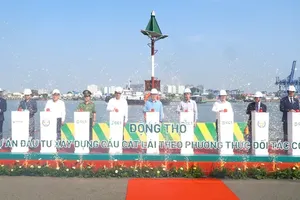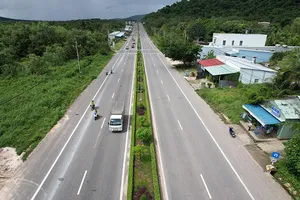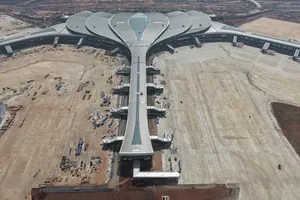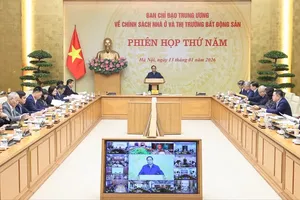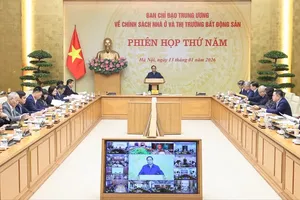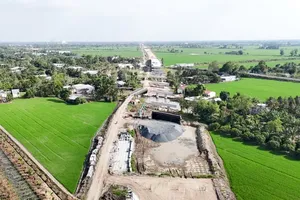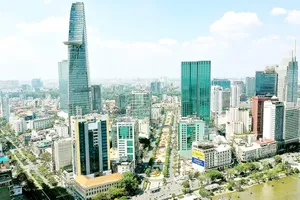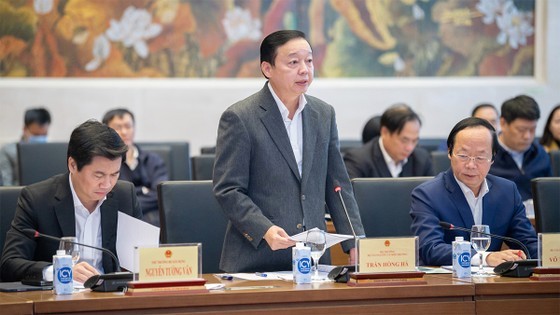 |
Minister Tran Hong Ha speaks at the explanation session on the implementation of policies and laws on waste management (Photo: SGGP) |
Minister Tran Hong Ha made the statement at the explanation session on the implementation of policies and laws on waste management organized by the National Assembly's Committee on Science, Technology, and Environment on December 19.
He added that to meet the requirements of environmental protection, localities have been quite confused as they must necessarily spend huge money on waste treatment technologies for the disposal, recycling, storage, or energy recovery from different waste types.
National Assembly Vice Chairman Nguyen Duc Hai said at the session that there is no effective solution to financial problems related to domestic solid waste treatment.
According to Vice Chairman of the National Assembly Nguyen Duc Hai, the waste treatment industry in general and domestic solid waste, in particular, should be treated like an industry and must operate according to the market mechanism.
The roadmap to convert fees into prices is mandatory, and then it is necessary to build a price on domestic waste treatment to offset the costs of recycling and garbage collection. The State only supports those who need support, and the operation of the waste treatment industry must follow the principles of a market economy following the ‘polluter pays’ principle - the commonly accepted practice that those who produce pollution should bear the costs of managing it to prevent damage to human health or the environment.
Minister of Natural Resources and Environment Tran Hong Ha committed in 2023 to issue specific guidelines for the implementation of the Law on Natural Resources and Environment and guidance on models of collection, classification and recycling of solid wastes. Moreover, the Ministry will continue to promulgate a list of standards and technical regulations on waste and emissions.
At the session, the Standing Committee of Science, Technology and Environment together with the delegates noted that, over the past time, the state management of environmental protection in general and the management of biological solid waste has been greatly improved. Activities in particular nationwide have seen many positive changes, especially after the issuance of the government’s Resolution No. 09/NQ-CP in January 2019 which assigned the Ministry to cooperate with chairpersons of municipal and provincial people's committees to take full responsibility for the management of solid waste and waste treatment in each locality.
However, there are still many difficulties in implementing the process and procedures for applying for a license to invest in a waste treatment plant; plus, policies to attract investment and call for social contribution to waste treatment in localities have not been applied synchronously.
Moreover, the rate of waste treated by direct burial is still high with 70 percent potentially causing environmental pollution, affecting people's quality of life.
In particular, the price policy for domestic solid waste collection is in fact inadequate, the current collection rate does not even meet the costs for collection and transportation. The investment in small-scale and scattered waste treatment facilities in some localities and rural areas is low efficiency, and difficult to control environmental standards and technical regulations. Meanwhile, there is a lack of mechanisms and policies to support and encourage investors to implement waste treatment projects.
At the meeting, Minister of Natural Resources and Environment Tran Hong Ha explained that at present, the project on strengthening the management capacity of solid waste produced by daily activities has been jointly developed and completed by ministries. Additionally, the procedures will be submitted to the Government and the implementation is expected promulgated in December this year ensuring financial preparation, governance capacity, model, technology and organization of domestic solid waste management to be implemented nationwide by 2025 as prescribed by the Law on Environmental Protection.
